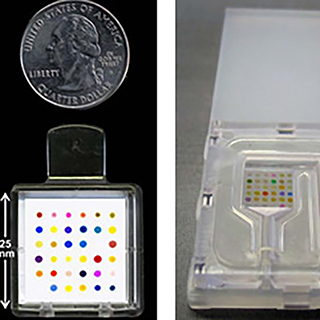Details
2009
Electronic Sensor Technologies Are Focus of NIH's Genes, Environment and Health Initiative and NIEHS' Exposure Biology Program

NIH- and NIEHS-funded researchers are focused on the development of electronic sensor technologies and similar devices such as so-called electronic noses. These small, wearable sensors could detect high exposures to toxic chemicals that pose serious health risks in the workplace or through accidental exposure. The research is conducted under an NIH-wide initiative launched in 2006 by the U.S. Department of Health and Human Services that includes NIEHS. In particular, an emphasis is placed on creating miniaturized wearable sensors for measuring pollutants, dietary intake, physical activity, and psychosocial stress, and the biological response to each of those factors.
The first grants were awarded in 2007 as part of the Genes, Environment and Health Initiative, a unique collaboration between geneticists and environmental scientists to translate new technologies in identifying genetic variation at the scale of the whole genome and comprehensive characterization of the personal environment.
Tags: genes, notable NIEHS programs
NIH/NIEHS Programs:
News Releases:
- 2009: Electronic Nose Sniffs out Toxins
- 2006: Two NIH Initiatives Launch Intensive Efforts to Determine Genetic and Environmental Roots of Common Diseases
- 2006: NIEHS Allocates $74 Million to Study Environmental Causes of Disease
Environmental Health Perspectives articles:


